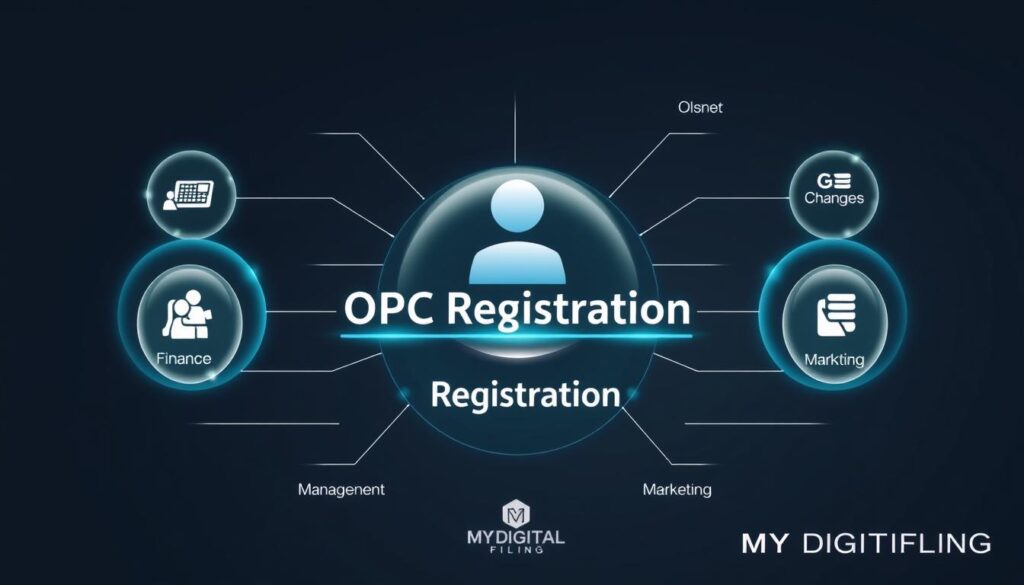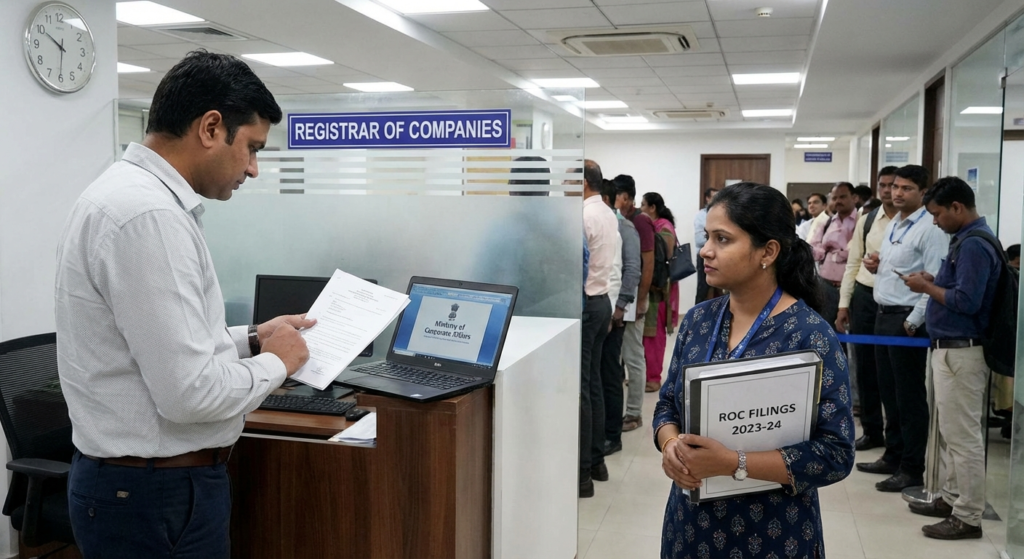Ever dreamed of starting your own company but felt stuck by traditional ways? The One Person Company (OPC) could be your answer. Introduced by the Companies Act 2013, it’s changing how we start businesses in India.
An OPC is a special single-member company. It’s easy to start and manage, like a sole proprietorship. But it also has the perks of a private limited company, like limited liability and a separate legal identity.
The OPC definition under the Companies Act 2013 has opened new doors for entrepreneurs. With about 34,446 OPCs in India and a 20% rise since 2014, it’s clear this structure is popular. Even big names like Flipkart started as an OPC before growing bigger.
If you’re thinking about starting an OPC, My Digital Filing can help. They offer free advice from experts like CAs to guide you through the process. Their knowledge can help you understand and use this business model’s unique features.
Key Takeaways
- OPCs offer limited liability protection and separate legal identity
- A single person can be both the director and member of an OPC
- OPCs enjoy tax benefits and reduced compliance requirements
- At least one director must be an Indian resident for 120+ days annually
- OPCs can have up to 15 directors and require minimal board meetings
- The OPC structure allows for easier access to funding opportunities
Introduction to One Person Company (OPC)
The Companies Act of 2013 brought a new idea to Indian company law – the One Person Company (OPC). This single-person business changed the corporate world. It gives entrepreneurs the benefits of a company and the ease of a sole proprietorship.
An OPC lets one person start a company. This is a big change in Indian business. The OPC introduction makes India like China, Singapore, and the UK, which already use this model.
- Single member or shareholder
- Nominee requirement
- Limited liability protection
- Minimum paid-up capital of Rs.1 lakh
- Only Indian citizens can form OPCs
OPCs have big advantages over being a sole proprietor. They protect your personal assets from business debts. This is great for startups and small businesses wanting a formal identity.
“OPCs bridge the gap between sole proprietorships and private limited companies, offering the best of both worlds.”
If you need help with OPC registration, My Digital Filing offers free consultations with expert CAs. Knowing how to form an OPC can help you make smart choices for your business.
Definition of One Person Company
The Companies Act 2013 brought a big change to Indian business law: the One Person Company (OPC). This new business type is great for solo entrepreneurs who want the perks of a company but don’t need partners. Let’s explore what an OPC is and its main features.
Meaning of OPC as per Companies Act, 2013
Section 2(62) of the Companies Act 2013 says an OPC is a company with just one owner. This single shareholder company lets one person own the company. It’s different from usual company setups, offering both corporate benefits and personal control.
Key characteristics of an OPC
OPCs have some special traits:
- Private company status
- Single-member structure
- Nominee requirement
- Limited liability
- Separate legal entity
These traits make OPCs great for new business owners. They offer better protection for assets and might save on taxes compared to being a sole proprietor.
Only Indian citizens can start an OPC. Recently, NRIs can start one after living in India for 120 days. This change opens doors for global entrepreneurs with ties to India.
“The OPC structure revolutionizes how individuals can engage in business, offering corporate benefits with simplified compliance.”
If you need help with setting up an OPC, My Digital Filing offers free advice from experts like Chartered Accountants. Their help can be very useful in understanding how to start your One Person Company.
Difference between OPCs and Sole Proprietorships
Starting a business in India offers many options. Two common choices are One Person Companies (OPCs) and sole proprietorships. Let’s look at the main differences between these, focusing on OPC vs sole proprietorship, limited liability, and legal entity status.
Liability Aspects
The biggest difference is in liability protection. In an OPC, your personal assets are safe from business debts. This is a big plus over sole proprietorships, where you’re personally on the hook for all business debts.
An OPC offers peace of mind by separating personal and business assets, protecting your financial future.
Legal Status and Ownership
OPCs have a separate legal identity, unlike sole proprietorships. This means OPCs can make contracts, own property, and sue or be sued in their own name. Sole proprietorships don’t have this legal separation, mixing personal and business identities.
Ownership is also different. Sole proprietorships have one owner, but OPCs need a nominee who can take over if the main owner can’t. This ensures the business keeps going and adds security.
| Aspect | OPC | Sole Proprietorship |
|---|---|---|
| Liability | Limited to investment | Unlimited personal liability |
| Legal Entity | Separate from owner | Same as owner |
| Ownership | Single member with nominee | Single owner |
If you need help registering an OPC, contact My Digital Filing for a free consultation from expert CAs.
Features of a One Person Company
One Person Companies (OPCs) have special OPC features that make them stand out in India. They mix the ease of being a sole owner with the perks of a private company.
Private Company Status
OPCs are seen as private companies under Section 3(1)(c) of the Companies Act, 2013. This means they get protection from personal liability. This keeps the owner’s personal assets safe from business debts.
Single-Member Structure
An OPC can start with just one person. This person is both the director and the shareholder. This makes it easier to make decisions and manage the business.
Nominee Requirement
OPCs have a special rule about nominees. When starting, the owner must pick a nominee. This person takes over the company if the owner dies or can’t work anymore.
Perpetual Succession
OPCs keep going forever, thanks to perpetual succession. If the original owner dies or can’t work, the nominee can take over. This keeps the business running smoothly.
Directors and Capital Requirements
The number of OPC directors can be from one to fifteen. There’s no minimum paid-up capital needed. This makes it easier for new businesses to start with little money.
| Feature | Requirement |
|---|---|
| Minimum Directors | 1 |
| Maximum Directors | 15 |
| Minimum Paid-up Capital | No minimum |
| Nominee | Required |
If you need help with OPC registration, My Digital Filing offers free advice from expert CAs.
“OPCs blend the simplicity of sole proprietorship with the robustness of a private company, offering entrepreneurs a unique business structure.”
Formation of One Person Companies
The OPC registration process in India has made starting a business easier for solo owners. Introduced by the Companies Act, 2013, it lets one person start a company with limited liability.
Incorporation Process and Requirements
To start an OPC, follow these steps:
- Obtain a Digital Signature Certificate (DSC)
- Apply for a Director Identification Number (DIN)
- Choose a unique company name
- Prepare and file necessary documents with the Registrar of Companies (ROC)
To start an OPC, you need at least one director who is a natural person and an Indian citizen. You can choose from different types of OPCs.
Memorandum of Association and Nominee Details
Drafting the Memorandum of Association (MOA) is key in OPC registration. It must include a nominee who takes over if the original member dies or becomes unable.
Important details about the nominee in OPC:
- The nominee must be an Indian citizen
- They can withdraw consent by giving written notice
- The sole member must nominate a new person within 15 days of receiving a withdrawal notice
- Changes in nominee details must be filed with the ROC within 30 days
Membership in One Person Companies
Knowing who can join a One Person Company (OPC) in India is key. The Companies Act, 2013 sets clear rules for members and nominees. Let’s look at these rules to help you understand OPCs better.
Eligibility Criteria for Members and Nominees
To join an OPC, you must meet some basic requirements:
- You must be a natural person and an Indian citizen
- You need to be a resident of India, staying at least 182 days in the preceding financial year
- You must be of legal age (minors are not allowed)
Your nominee should also be an Indian citizen and resident. This ensures the company is managed if you can’t.
Restrictions on Multiple Memberships
The law has rules to keep OPCs fair:
- You can be a member or nominee of only one OPC at a time
- If you’re involved in multiple OPCs, you must withdraw from all but one within 180 days
Conversion of OPCs into other Companies
One Person Companies (OPCs) can change into other types of companies. This is called OPC conversion. It helps businesses grow and expand. Let’s look at the main points of this change.
Restrictions on conversion to Section 8 companies
OPCs have limits when trying to become Section 8 companies. These are groups focused on charity. The law stops this to keep OPCs and Section 8 companies different.
Voluntary conversion after two years
OPCs can choose to change after two years. This wait helps the company settle first. They can switch to private limited companies without needing a lot of money or sales.
- Notifying the Registrar of Companies (ROC) within 60 days
- Filing Form INC-6 with the Ministry of Corporate Affairs
- Submitting altered Memorandum and Articles of Association
- Providing a list of proposed members and directors
- Obtaining necessary approvals from creditors
This change lets OPCs have up to 200 members and not be limited by 50 lakh rupees in share capital. If you need help with OPC registration or conversion, contact My Digital Filing for free advice from our expert CAs.
| Aspect | OPC | Private Limited Company |
|---|---|---|
| Maximum Members | 1 | 200 |
| Share Capital Limit | 50 lakhs | No limit |
| Minimum Directors | 1 | 2 |
Removing the need to convert automatically gives OPCs more freedom. This supports new businesses and helps the economy grow.
Privileges and Exemptions of One Person Companies
One Person Companies (OPCs) in India have special benefits and exemptions under the Companies Act 2013. These advantages make OPCs a great choice for solo entrepreneurs wanting a formal business setup.
Exemption from Annual General Meetings
OPCs don’t need to hold annual general meetings. This makes their operations simpler. Since there’s only one member-director, there’s no need for big meetings.
Simplified Financial Reporting for OPC
OPCs have easier financial reporting compared to other companies. They don’t have to prepare cash flow statements. This makes things simpler for the sole member and keeps things clear.
| Requirement | OPC | Private Limited Company |
|---|---|---|
| Cash Flow Statement | Not Required | Required |
| Annual Return Signatory | Director or Company Secretary | Company Secretary |
| Board Meetings per Year | 2 | 4 |
Relaxed Compliance Requirements
OPCs have more relaxed rules in many areas. They only need two board meetings a year, with a 90-day gap. The annual return can be signed by the director, not just a company secretary. This gives more freedom in management.
“OPCs allow entrepreneurs to enjoy corporate benefits with reduced compliance burdens, fostering a conducive environment for small businesses to thrive.”
These benefits and exemptions make OPCs a top choice for solo entrepreneurs. They want to formalize their business but keep things simple and low on paperwork.
Advantages of One Person Company
One Person Companies (OPCs) offer many benefits for entrepreneurs in India. They provide control and protection, making them great for solo ventures.
OPCs give you limited liability protection. This means your personal assets are safe from business debts. You can have a private company feel while owning it alone. With just one person needed for decisions, things move quickly.
OPCs also help with money matters. You can get funds from venture capital or loans, helping your business grow. Plus, there are fewer rules to follow, like only two board meetings a year.
“OPCs combine the best of both worlds – the simplicity of a sole proprietorship with the robustness of a company structure.”
Another big plus is the ability to keep your business going even if you can’t. This is thanks to the nominee system. OPCs also get tax breaks, with a 30% profit rate and possible salary deductions.
- Limited liability protection
- Simplified compliance
- Easy fundraising options
- Perpetual succession
- Tax benefits
Disadvantages of One Person Company
One Person Companies (OPCs) have many benefits, but they also have drawbacks. It’s important for entrepreneurs to know these limitations before choosing this structure.
Limitations on Business Activities
OPCs face several restrictions that can slow down growth. They can’t do Non-Banking Financial Investment activities, which limits their financial work. Also, OPCs can’t turn into Section 8 companies, which are usually non-profit.
Restrictions on Ownership and Management
The single-member structure of OPCs makes it hard to raise capital and expand ownership. Since there can only be one shareholder, OPCs can’t issue shares to attract investors or partners. This can really limit the company’s growth.
“OPCs are designed for small businesses and can have only one member at any time, limiting their potential for growth and raising funds.”
Having one person in charge can lead to ethical issues and conflicts of interest. Without others to balance decisions, there might not be enough diversity and objectivity.
- Limited access to capital due to single ownership
- Restricted growth potential compared to other company structures
- Inability to convert into a charity under Section 8 of the Companies Act, 2013
- Mandatory nominee requirement, which can complicate succession planning
These restrictions can be big challenges for businesses wanting to grow fast or diversify.
What is an OPC? Key Takeaways
Understanding the One Person Company (OPC) is key for entrepreneurs in India. Here’s a quick summary of what you need to know:
The Companies Act, 2013 introduced the OPC. It lets one person start a company. This mix of company benefits and sole proprietorship flexibility is unique.
- Single member: Only one shareholder is required
- Limited liability: Personal assets are protected
- Legal entity: Separate from its owner
- Indian resident: Member must be an Indian citizen residing in India
- Simplified compliance: Reduced regulatory requirements
OPCs are great for small businesses and solo entrepreneurs. They offer protection for personal assets and are easy to manage. This makes them perfect for starting your business journey.
“An OPC combines the benefits of a company structure with the flexibility of sole proprietorship, making it an excellent choice for individual entrepreneurs.”
| Feature | OPC | Traditional Company |
|---|---|---|
| Minimum Members | 1 | 2 |
| Maximum Directors | 15 | 15 |
| Annual General Meeting | Not required | Required |
| Conversion Restrictions | Yes | No |
OPCs have many benefits but also some limits. They restrict business activities and ownership. Think about these when deciding if an OPC is right for you.
Conclusion
One Person Company (OPC) in India is a big change for entrepreneurs. It was introduced by the Companies Act of 2013. OPCs mix corporate benefits with easy operation. They need only Rs.1 lakh as the minimum authorized capital.
OPCs have many benefits in forming and managing companies. They can get funding from investors and banks because they are private companies. They also have simple rules, like no need for annual meetings and easy financial reports.
Even though OPCs have some limits, like not all business types are allowed, they help a lot in India. As the business world grows, OPCs will be key in boosting the economy. They offer a great option for solo entrepreneurs who want corporate benefits but easy operation.
FAQ
Q: What is an OPC (One Person Company)?
A: An OPC is a company run by one person. It has features like perpetual succession and limited liability. It’s great for entrepreneurs who want to start small.
Q: How to form an OPC (One Person Company)?
A: To start an OPC, one person needs to subscribe to the company’s memorandum. They must meet the Companies Act, 2013 requirements. This includes getting a Digital Signature Certificate and filing documents with the Registrar of Companies.
Q: What is the difference between a private company and an OPC (One Person Company)?
A: OPCs are private companies but have only one member. They need a nominee during registration. They can have up to 15 directors.
Q: How is an OPC (One Person Company) taxed?
A: OPCs are taxed like private companies in India. They pay corporate income tax based on their income.
Q: What are the benefits of forming an OPC (One Person Company)?
A: OPCs offer limited liability and a separate legal entity. They can raise funds easily and have simple compliance. The single-member structure makes decision-making quick.
Q: What are the advantages of forming an OPC (One Person Company)?
A: OPCs provide limited liability and a separate legal entity. They are easy to manage and can raise funds. They also have perpetual succession through nominees.
Q: What are the disadvantages of an OPC (One Person Company)?
A: OPCs are best for small businesses. They can’t do Non-Banking Financial Investment activities. They have limited capital raising and a blurred line between ownership and management.
Q: What are the name guidelines for an OPC (One Person Company)?
A: OPCs must have “One Person Company” or “OPC” in their name.
Q: What is the difference between an OPC and an LLP?
A: OPCs have one member, while LLPs have multiple partners. OPCs have a structured corporate framework, while LLPs are more flexible.
Q: How many shareholders can an OPC have?
A: An OPC can have only one shareholder.
Q: Is an audit required for an OPC (One Person Company)?
A: Yes, if their paid-up capital is over Rs. 50 lakhs or average turnover is over Rs. 2 crores, OPCs need an annual audit.
Q: What are the mandatory requirements for an OPC (One Person Company)?
A: OPCs need a single Indian citizen member and a nominee. They must convert to a private or public company if they meet certain financial thresholds.
Q: What are the annual compliances for an OPC (One Person Company)?
A: OPCs must file annual returns and prepare financial statements. They need to hold board meetings and keep statutory records.
Please Rate this post
Click to rate











